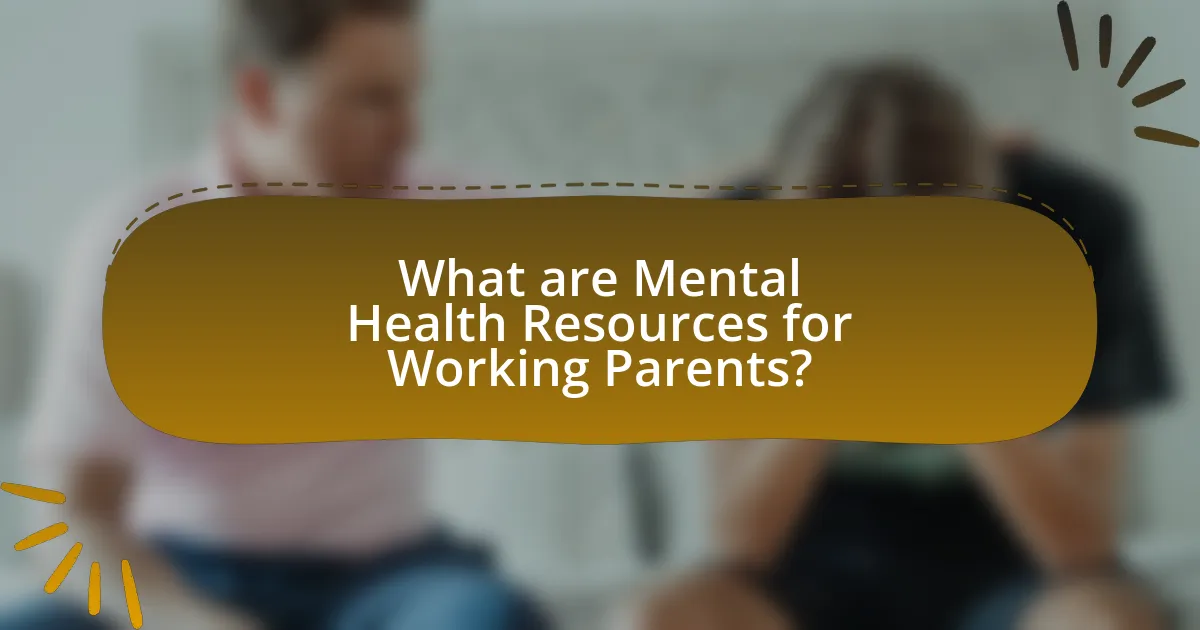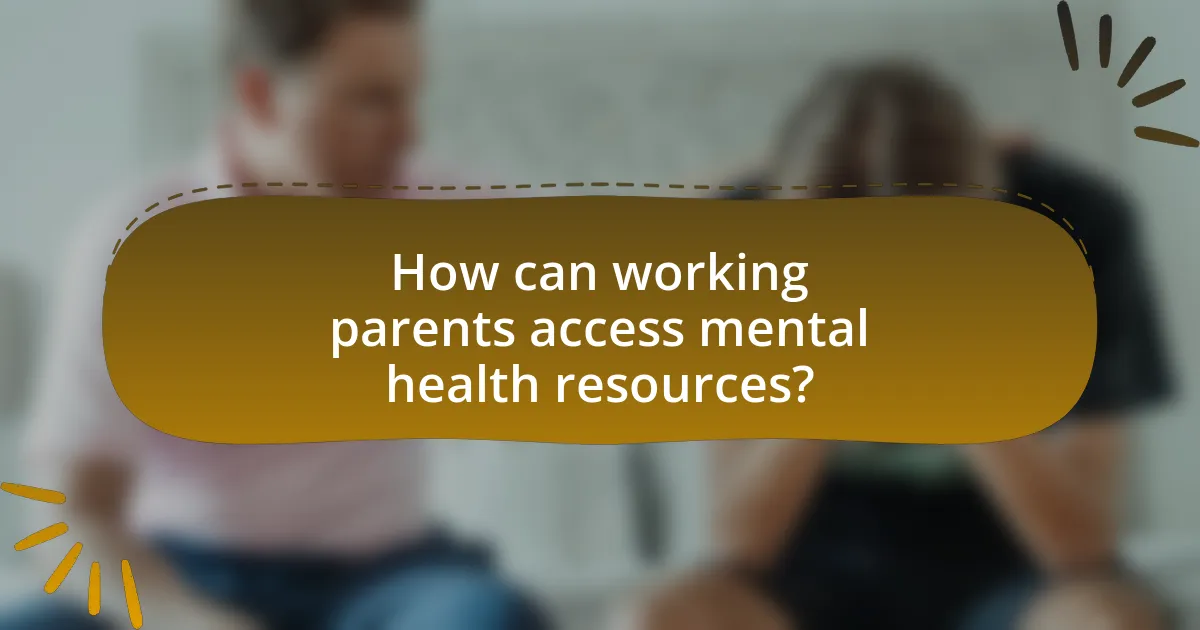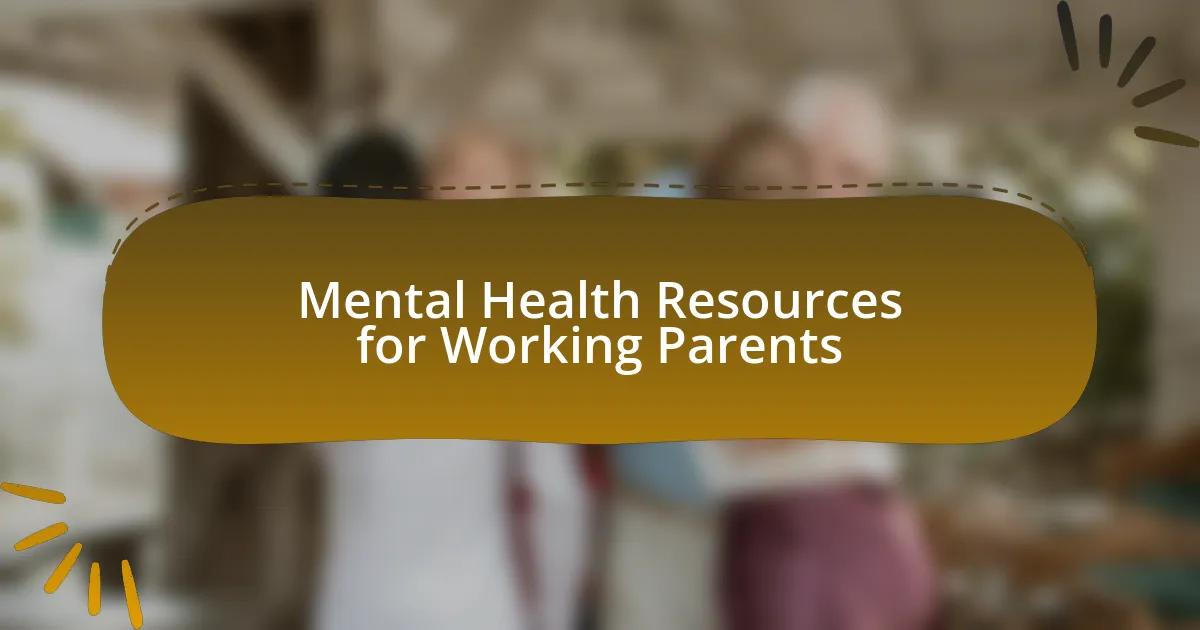Mental health resources for working parents encompass a range of services designed to support their well-being, including employee assistance programs (EAPs), counseling services, support groups, and online platforms. These resources are vital for managing stress and achieving work-life balance, as mental health significantly influences parents’ productivity and family dynamics. The article explores the challenges faced by working parents, the types of available mental health resources, and the barriers to accessing these services. It also highlights effective strategies for improving mental health, the role of community support, and practical tips for maintaining well-being amidst the demands of work and parenting.

What are Mental Health Resources for Working Parents?
Mental health resources for working parents include employee assistance programs (EAPs), counseling services, support groups, and online mental health platforms. EAPs provide confidential counseling and resources through employers, helping parents manage stress and work-life balance. Counseling services, available through healthcare providers, offer professional support for mental health challenges. Support groups, both in-person and online, allow parents to share experiences and coping strategies. Online platforms like BetterHelp and Talkspace provide accessible therapy options, catering to the busy schedules of working parents. These resources are essential for promoting mental well-being and reducing stress among working parents.
Why is mental health important for working parents?
Mental health is crucial for working parents because it directly impacts their ability to perform effectively in both their professional and personal lives. When parents maintain good mental health, they are more likely to experience lower stress levels, improved focus, and better emotional regulation, which enhances their productivity at work and their interactions with their children. Research indicates that parents with positive mental health are more engaged and responsive to their children’s needs, fostering healthier family dynamics. Additionally, according to the World Health Organization, mental health issues can lead to absenteeism and decreased job performance, highlighting the importance of mental well-being in maintaining a balanced work-life integration.
What challenges do working parents face regarding mental health?
Working parents face significant challenges regarding mental health, primarily due to the stress of balancing work and family responsibilities. This dual role often leads to feelings of overwhelm, anxiety, and burnout, as parents struggle to meet the demands of their jobs while also providing care and support for their children. Research indicates that approximately 70% of working parents report experiencing high levels of stress, which can negatively impact their mental well-being and overall quality of life. Additionally, the lack of flexible work arrangements and insufficient access to mental health resources exacerbates these challenges, making it difficult for parents to seek help when needed.
How can mental health impact work-life balance for parents?
Mental health significantly impacts work-life balance for parents by influencing their emotional well-being and capacity to manage responsibilities. When parents experience mental health issues such as anxiety or depression, they may struggle with focus, motivation, and energy levels, which can lead to decreased productivity at work and increased stress at home. Research indicates that parents with poor mental health are more likely to report difficulties in balancing work and family obligations, resulting in conflicts and reduced quality of life. For instance, a study published in the Journal of Occupational Health Psychology found that parents with higher levels of psychological distress experienced greater work-family conflict, highlighting the direct correlation between mental health and work-life balance.
What types of mental health resources are available for working parents?
Working parents have access to various mental health resources, including employee assistance programs (EAPs), counseling services, support groups, and online mental health platforms. EAPs often provide confidential counseling and referrals for mental health issues, which can be beneficial for managing stress and work-life balance. Counseling services, whether through private practices or community health centers, offer personalized support for mental health challenges. Support groups, both in-person and virtual, allow working parents to connect with others facing similar challenges, fostering a sense of community and shared experience. Online mental health platforms, such as teletherapy services, provide flexible access to licensed therapists, making it easier for working parents to seek help without disrupting their schedules. These resources collectively aim to support the mental well-being of working parents, addressing the unique stressors they face.
What are the different categories of mental health resources?
The different categories of mental health resources include professional services, support groups, educational materials, and self-help tools. Professional services encompass therapists, psychologists, and psychiatrists who provide clinical support. Support groups offer community and shared experiences for individuals facing similar challenges. Educational materials consist of books, articles, and online courses that inform about mental health issues and coping strategies. Self-help tools include apps and online platforms designed to promote mental well-being through mindfulness, stress management, and emotional regulation techniques. These categories collectively address various aspects of mental health, providing comprehensive support for individuals seeking assistance.
How can online resources support working parents’ mental health?
Online resources can support working parents’ mental health by providing access to information, community support, and mental health services. These resources include online therapy platforms, parenting forums, and mental health apps that offer coping strategies and stress management techniques. For instance, a study published in the Journal of Medical Internet Research found that online mental health interventions significantly reduce symptoms of anxiety and depression among parents. Additionally, platforms like forums and social media groups allow parents to connect with others facing similar challenges, fostering a sense of community and shared experience, which is crucial for emotional well-being.

How can working parents access mental health resources?
Working parents can access mental health resources through employee assistance programs (EAPs), community mental health services, and online platforms. Many employers offer EAPs that provide confidential counseling and support services at no cost to employees. Community mental health services often include local clinics and hotlines that cater to families, offering therapy and support groups. Additionally, online platforms such as teletherapy services and mental health apps provide flexible access to licensed professionals, allowing working parents to seek help at their convenience. According to the National Alliance on Mental Illness, approximately 1 in 5 adults experience mental illness, highlighting the importance of accessible resources for those in need.
What steps can parents take to find suitable mental health support?
Parents can find suitable mental health support by researching local mental health professionals, utilizing online directories, and seeking recommendations from trusted sources. First, parents should identify their specific needs, such as therapy for anxiety or support groups for stress management. Then, they can use resources like the American Psychological Association’s directory or Psychology Today’s therapist finder to locate qualified professionals in their area. Additionally, parents can consult their pediatrician or family doctor for referrals, as healthcare providers often have connections to mental health resources. Engaging with community organizations or school counselors can also provide valuable insights and recommendations tailored to their child’s needs.
How do workplace mental health programs work?
Workplace mental health programs work by providing employees with resources and support to manage their mental well-being. These programs typically include services such as counseling, stress management workshops, and mental health awareness training. Research indicates that organizations implementing such programs can see a reduction in absenteeism and an increase in employee productivity. For instance, a study published in the Journal of Occupational Health Psychology found that workplaces with mental health initiatives reported a 25% decrease in employee turnover and a 30% increase in job satisfaction. This evidence demonstrates the effectiveness of workplace mental health programs in fostering a supportive environment for employees.
What role do community organizations play in providing mental health resources?
Community organizations play a crucial role in providing mental health resources by offering accessible support services, educational programs, and advocacy for mental health awareness. These organizations often serve as a bridge between individuals and professional mental health services, facilitating access to counseling, support groups, and crisis intervention. For instance, the National Alliance on Mental Illness (NAMI) provides resources and support for families affected by mental illness, demonstrating the impact of community organizations in enhancing mental health literacy and reducing stigma. Additionally, studies show that community-based interventions can lead to improved mental health outcomes, highlighting the effectiveness of these organizations in addressing mental health needs within local populations.
What are the barriers to accessing mental health resources for working parents?
Working parents face several barriers to accessing mental health resources, including time constraints, financial limitations, and stigma. Time constraints arise from balancing work responsibilities and family obligations, making it difficult for parents to seek help. Financial limitations can prevent access to therapy or counseling services, as many working parents may not have adequate insurance coverage or the means to pay out-of-pocket. Stigma surrounding mental health issues can also deter parents from seeking assistance, as they may fear judgment from peers or employers. According to a survey by the American Psychological Association, 61% of working parents reported that their job responsibilities hindered their ability to prioritize mental health care.
How does stigma affect parents seeking mental health support?
Stigma significantly hinders parents from seeking mental health support by instilling fear of judgment and discrimination. This fear can lead to feelings of shame and isolation, causing parents to avoid necessary help. Research indicates that approximately 60% of individuals with mental health issues do not seek treatment due to stigma, as highlighted in a study published in the Journal of Health and Social Behavior. This avoidance can exacerbate mental health conditions, negatively impacting both the parents and their children.
What financial considerations should parents keep in mind?
Parents should keep in mind the costs associated with childcare, education, and mental health resources. Childcare expenses can significantly impact a family’s budget, with the average annual cost for full-time care ranging from $5,000 to $20,000 depending on location and age of the child. Additionally, education-related costs, including tuition, supplies, and extracurricular activities, can add up quickly, often exceeding $10,000 per year for private schooling. Mental health resources, such as therapy or counseling, may also incur costs, with sessions averaging between $75 to $200 each. Understanding these financial obligations is crucial for parents to effectively manage their budgets and ensure they can provide necessary support for their children’s well-being.

What strategies can working parents use to improve their mental health?
Working parents can improve their mental health by implementing strategies such as establishing a consistent routine, prioritizing self-care, and seeking social support. A consistent routine helps create stability, which can reduce stress and anxiety. Prioritizing self-care activities, such as exercise, mindfulness, or hobbies, has been shown to enhance emotional well-being and resilience. Additionally, seeking social support from friends, family, or support groups can provide emotional relief and practical assistance, which is crucial for managing the demands of work and family life. Research indicates that social connections significantly contribute to improved mental health outcomes, highlighting the importance of community and relationships in coping with stress.
How can parents incorporate self-care into their busy schedules?
Parents can incorporate self-care into their busy schedules by prioritizing short, intentional breaks throughout the day. Research indicates that even brief moments of self-care, such as five minutes of deep breathing or a short walk, can significantly reduce stress and improve overall well-being. For instance, a study published in the Journal of Occupational Health Psychology found that micro-breaks can enhance productivity and mental health, making it easier for parents to manage their responsibilities while also caring for themselves. By scheduling these small breaks and treating them as non-negotiable appointments, parents can effectively integrate self-care into their daily routines.
What are effective self-care practices for working parents?
Effective self-care practices for working parents include setting boundaries, prioritizing time for self-care activities, and seeking social support. Setting boundaries helps parents manage work-life balance, reducing stress and preventing burnout. Research indicates that parents who establish clear work and family time experience lower levels of anxiety and improved mental health. Prioritizing self-care activities, such as exercise, hobbies, or relaxation techniques, contributes to overall well-being; studies show that regular physical activity can enhance mood and reduce stress. Additionally, seeking social support from friends, family, or parenting groups provides emotional relief and practical assistance, which is crucial for maintaining mental health.
How can mindfulness and stress management techniques benefit parents?
Mindfulness and stress management techniques can significantly benefit parents by enhancing their emotional regulation and reducing anxiety. These practices help parents cultivate present-moment awareness, which can lead to improved interactions with their children and a more balanced approach to parenting. Research indicates that mindfulness can decrease stress levels by promoting relaxation and increasing resilience against daily challenges. For instance, a study published in the Journal of Child and Family Studies found that parents who engaged in mindfulness practices reported lower levels of parenting stress and greater satisfaction in their roles. This evidence underscores the effectiveness of mindfulness and stress management in fostering a healthier family environment.
What support systems can enhance mental health for working parents?
Support systems that can enhance mental health for working parents include flexible work arrangements, access to mental health resources, and supportive workplace cultures. Flexible work arrangements, such as remote work options and adjustable hours, allow parents to balance their professional and personal responsibilities, reducing stress. Access to mental health resources, including counseling services and employee assistance programs, provides parents with the necessary tools to manage their mental well-being. Supportive workplace cultures that prioritize mental health awareness and promote open communication can further alleviate feelings of isolation and anxiety among working parents. Research indicates that organizations with strong mental health support systems see improved employee satisfaction and productivity, highlighting the importance of these systems for working parents.
How can family and friends provide support for mental well-being?
Family and friends can provide support for mental well-being by offering emotional support, practical assistance, and fostering open communication. Emotional support includes actively listening and validating feelings, which has been shown to reduce stress and improve mental health outcomes. Practical assistance, such as helping with childcare or household tasks, alleviates the burden on working parents, allowing them more time to focus on self-care. Additionally, fostering open communication encourages individuals to express their struggles, leading to stronger relationships and a sense of belonging, both of which are crucial for mental well-being. Research indicates that social support significantly correlates with lower levels of anxiety and depression, highlighting the importance of these supportive roles.
What role do parenting groups and networks play in mental health?
Parenting groups and networks play a crucial role in enhancing mental health by providing social support, reducing feelings of isolation, and sharing valuable resources among parents. These groups foster a sense of community, allowing parents to connect with others who face similar challenges, which can alleviate stress and anxiety. Research indicates that social support from such networks is linked to improved mental well-being, as evidenced by a study published in the Journal of Family Psychology, which found that parents who engaged in support groups reported lower levels of depression and higher levels of life satisfaction. Additionally, parenting networks often facilitate access to mental health resources, workshops, and expert advice, further contributing to the overall mental health of parents.
What are some practical tips for maintaining mental health as a working parent?
To maintain mental health as a working parent, prioritize self-care by scheduling regular breaks and engaging in activities that promote relaxation and joy. Research indicates that self-care practices, such as exercise and mindfulness, can significantly reduce stress levels and improve overall well-being. Additionally, establishing a support network of family, friends, or colleagues can provide emotional assistance and practical help, which is crucial for managing the demands of work and parenting. Studies show that social support is linked to lower levels of anxiety and depression among parents. Lastly, setting realistic expectations and boundaries at work and home can help prevent burnout, as unrealistic demands can lead to increased stress and mental health challenges.
